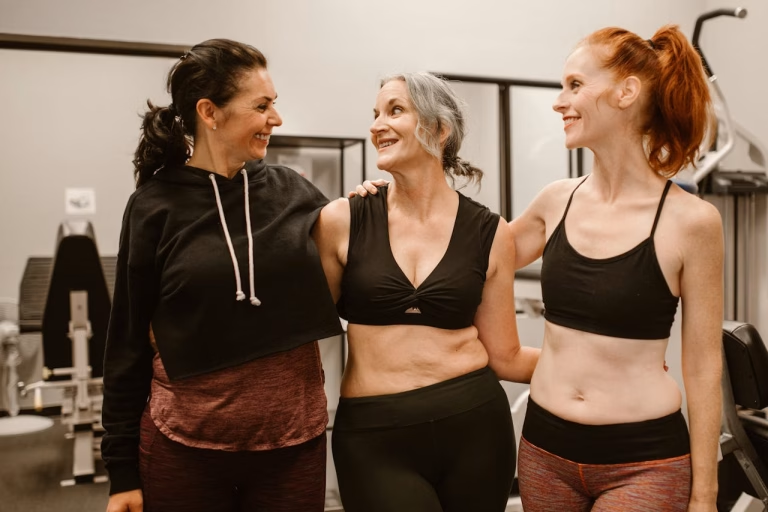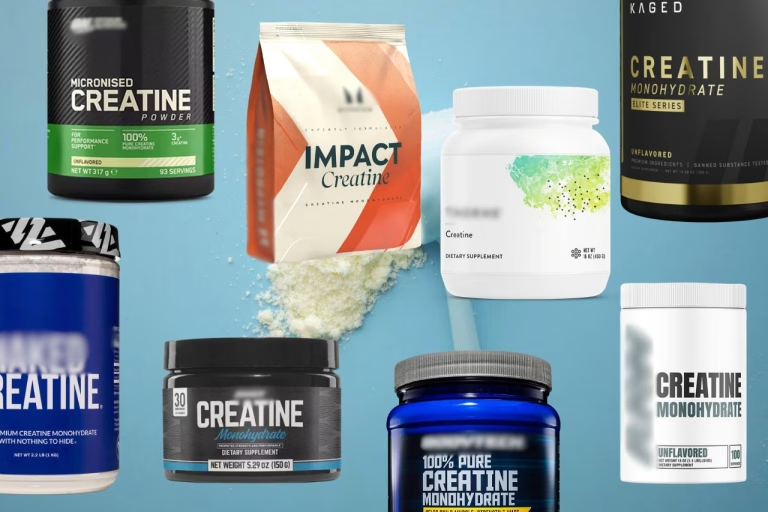I am a 40-year-old woman on a plant-based diet that exercises 5 to 6 times a week, and I take creatine almost every day. More women are discovering the benefits of creatine, and it’s time to debunk the myths surrounding this powerful supplement.
In this article, I will be breaking down why creatine is essential for women’s health from both fitness and cognitive and bone health perspectives; I will be addressing myths surrounding it. I will touch on why creatine is especially beneficial if you are a woman in your 40s or later or eating a plant-based diet.
TL;DR
Creatine is one of the most researched supplements, and it supports more than just muscle growth and maintenance – it can also benefit brain and bone health. It may be especially helpful for women as we age, since women typically have lower creatine stores than men.
What is Creatine?
Creatine is a natural compound that can be found in muscle cells. It produces energy and is crucial for many physiological processes. (5)
Creatine helps regenerate adenosine triphosphate (ATP), the body’s primary energy source. During intense activities like sprinting or weightlifting, ATP gets depleted quickly. Creatine replenishes it, maintaining your performance.
The most commonly used creatine is creatine monohydrate, the most studied, proven, affordable, and safe. Creatine monohydrate is highly bioavailable, meaning it is efficiently absorbed and utilized by the body. Micronized creatine monohydrate is easier to dissolve in water and digest.
Our bodies produce creatine naturally, and we can get it with food. You can only get creatine from animal food sources like meat, poultry, fish, seafood, and cow’s milk. If you are on a plant-based diet or over 40, or like me- both, you should consider supplementing, and I will explain why.
Creatine for Women Over 40 is essential, here’s why:
As we age, we experience a natural decline in muscle mass, bone density, and cognitive function.
Creatine supplementation is more critical for women, as they have 70–80% lower endogenous creatine stores than men. (1)
This is how creatine can help with:
Muscle Health:
Age-related muscle loss, or sarcopenia, can lead to weakness and reduced mobility. Creatine supplementation supports muscle repair and growth; therefore, it is excellent for maintaining strength and functionality (6).
Bone Health:
When combined with resistance training, creatine may improve bone density, reducing the risk of fractures and osteoporosis (2)
Cognitive Benefits:
Not only do muscles use creatine for energy, but so does our brain. Creatine supplementation can enhance memory, focus, and mental clarity, especially as cognitive function declines with age. Creatine is also proven to improve our mood. (1)
Energy and Endurance:
Creatine replenishes energy stores, helping us feel energized throughout the day and perform better during workouts or daily activities. It also helps muscle recovery post-exercise. (3)
Creatine and Plant-Based Diets
Although our bodies create creatine efficiently, you can also get it from food. Unfortunately, no plant-based foods have creatine, so you should supplement if you are an athlete, exercise, or want to help your body build creatine reserves while on a plant-based diet.
Studies show that due to smaller stores of creatine in muscles, vegetarians and vegans benefit more from supplementing creatine than omnivores. ( 4)
“Creatine supplementation increased lean tissue mass, type II fiber area, insulin-like growth factor-1, muscular strength, muscular endurance, Wingate mean power output, and brain function (memory and intelligence) in vegetarian participants.”(4)

Myths About Creatine Use for Women
Myth 1: Creatine Causes Bulky Muscles
Creatine helps muscles to recover and grow, but it does not make you bulky.
Myth 2: Creatine Causes Water Retention and Weight Gain
While creatine may cause water retention at the cellular level, it simply means that muscles are more hydrated and ready for performance. This is not the same as bloating or gaining fat.
Myth 3: Creatine is a Steroid
Creatine is not a steroid; it’s a naturally occurring compound. Decades of research confirm its safety when used within recommended doses. (9)
How are Creatine supplements made? Is creatine vegan?
Creatine supplements, like creatine monohydrate, are manufactured synthetically in labs. They are made using sarcosine (a sodium salt)(7) and cyanamide(8). This means that creatine is vegan, as no animal products are required to produce it.
Synthetic creatine is highly pure and free of contaminants. It is highly bioavailable and absorbs into muscles better than dietary creatine.
How to Use Creatine?
Choose a good quality Creatine Monohydrate. Ensure it is 3rd party tested for impurities and has no unnecessary additives.
Dosage
A standard daily dose of 3–5 grams is sufficient for most women. Studies show no benefit of consuming more creatine for muscle maintenance.
When to take Creatine?
If you are taking Creatine to improve brain function and focus, taking it in the morning is best. If you are taking it for muscle growth, take it one hour before or after your exercise. However, overall, daily consistency is more important than exact timing, as the key benefit of creatine comes from saturating your muscles with it over time.
Stay Hydrated
Drink plenty of water to stay hydrated while using creatine, as it draws water into muscle cells.
If I exercise that day, I take one scoop of creatine before or after the workout. If I know that the workout will be hard, I take it before it to boost my energy. I definitely can run for a longer time when supplementing with creatine.
I only started taking creatine on the rest days recently, but I already noticed that I can stay focused longer.
Who should not take creatine?
If you have pre-existing medical conditions, are taking medications, or belong to a higher-risk group (e.g., pregnant women), consult your doctor before taking creatine. For most healthy adults, creatine is safe and well-tolerated when taken 3 to 5 g daily.
Can pregnant women take creatine?
Studies suggest that while creatine supplementation during pregnancy could offer potential benefits such as increased skeletal muscle, improved mood, and fetal neuroprotection there is currently not enough empirical evidence and safety data to conclusively determine its safety for pregnant women.(10)(11). So you should consult your health provider if you are considering taking creatine whilst pregnant.
Conclusion: Embracing Creatine For Women
Creatine greatly benefits women, particularly those over 40, by enhancing muscle, bone, and cognitive health. Combined with regular exercise, it can help you feel stronger and sharper for longer.
I have researched, tested, and created a list of my top favorite creatine brands for you to check out.
If you want to try out creatine, here are the best creatine brands and the best creatine products for women.
Please Note: This post is for informational purposes only and is based on my research. It’s not medical advice. It’s always best to consult a healthcare professional with health concerns. Enjoy reading!
If you are looking for ways to improve your routine, read: What I Changed in My Routine as a 40-Year-Old Woman to Feel My Best
Research References
- Smith‐Ryan, A., Cabre, H., Eckerson, J., & Candow, D. (2021). Creatine Supplementation in Women’s Health: A Lifespan Perspective. Nutrients, 13. https://doi.org/10.3390/nu13030877.
- Candow, D., Forbes, S., Chilibeck, P., Cornish, S., Antonio, J., & Kreider, R. (2019). Effectiveness of Creatine Supplementation on Aging Muscle and Bone: Focus on Falls Prevention and Inflammation. Journal of Clinical Medicine, 8. https://doi.org/10.3390/jcm8040488.
- Kreider, R., Kalman, D., Antonio, J., Ziegenfuss, T., Wildman, R., Collins, R., Candow, D., Kleiner, S., Almada, A., & Lopez, H. (2017). International Society of Sports Nutrition position stand: safety and efficacy of creatine supplementation in exercise, sport, and medicine. Journal of the International Society of Sports Nutrition, 14. https://doi.org/10.1186/s12970-017-0173-z.
- Kaviani, M., Shaw, K., & Chilibeck, P. (2020). Benefits of Creatine Supplementation for Vegetarians Compared to Omnivorous Athletes: A Systematic Review. International Journal of Environmental Research and Public Health, 17. https://doi.org/10.3390/ijerph17093041.
- https://www.health.harvard.edu/exercise-and-fitness/what-is-creatine-potential-benefits-and-risks-of-this-popular-supplement
- Dolan, E., Artioli, G., Pereira, R., & Gualano, B. (2019). Muscular Atrophy and Sarcopenia in the Elderly: Is There a Role for Creatine Supplementation?. Biomolecules, 9. https://doi.org/10.3390/biom9110642.
- https://en.wikipedia.org/wiki/Sarcosine
- https://en.wikipedia.org/wiki/Cyanamide#:~:text=Cyanamide%20is%20an%20organic%20compound,attached%20to%20an%20amino%20group.
- Antonio, J., Candow, D., Forbes, S., Gualano, B., Jagim, A., Kreider, R., Rawson, E., Smith‐Ryan, A., VanDusseldorp, T., Willoughby, D., & Ziegenfuss, T. (2021). Common questions and misconceptions about creatine supplementation: what does the scientific evidence really show?. Journal of the International Society of Sports Nutrition, 18. https://doi.org/10.1186/s12970-021-00412-w.
- Smith‐Ryan, A., Cabre, H., Eckerson, J., & Candow, D. (2021). Creatine Supplementation in Women’s Health: A Lifespan Perspective. Nutrients, 13. https://doi.org/10.3390/nu13030877.
- Dickinson, H., Ellery, S., Ireland, Z., LaRosa, D., Snow, R., & Walker, D. (2014). Creatine supplementation during pregnancy: summary of experimental studies suggesting a treatment to improve fetal and neonatal morbidity and reduce mortality in high-risk human pregnancy. BMC Pregnancy and Childbirth, 14, 150 – 150. https://doi.org/10.1186/1471-2393-14-150.
Silvija Meilunaite, PN1-NC, CSMC, is a certified nutrition and menopause coaching specialist who writes about midlife health, nutrition, and evidence-based wellness. She focuses on research-driven approaches to feeling better in your 40s and beyond, with a special interest in low-tox living and supportive daily habits.
- This author does not have any more posts.






